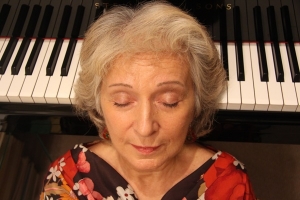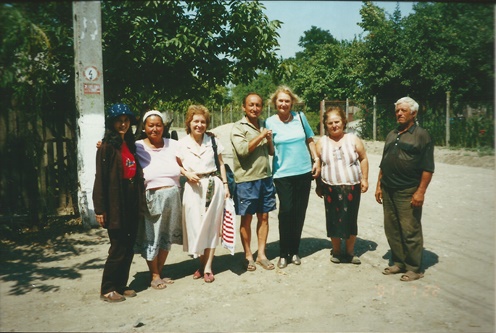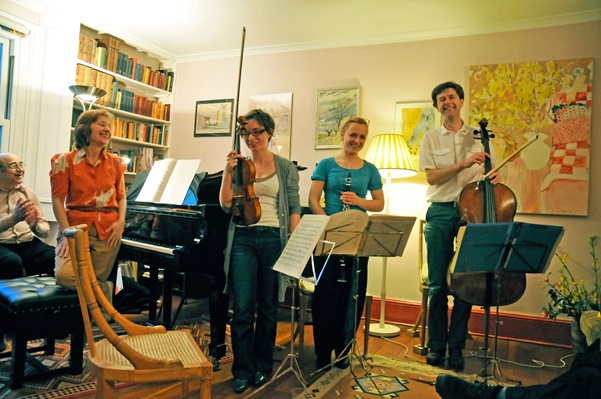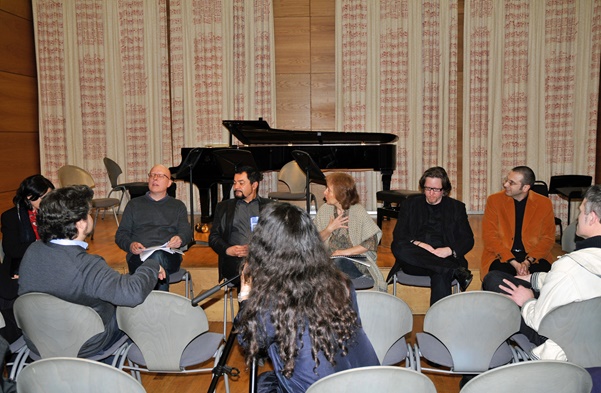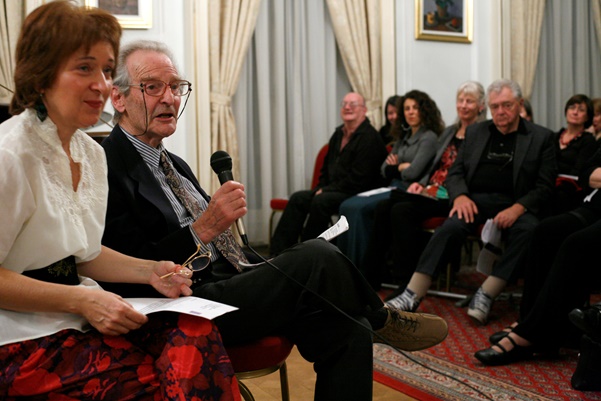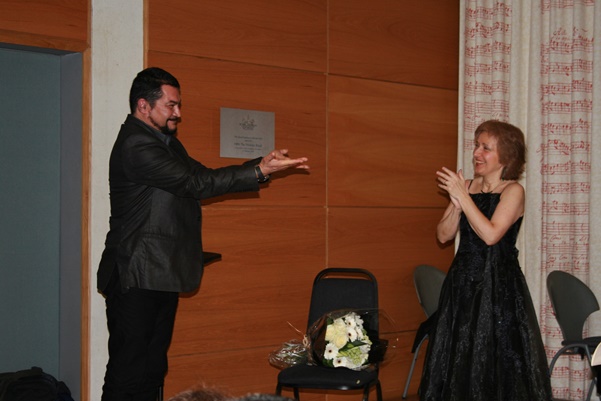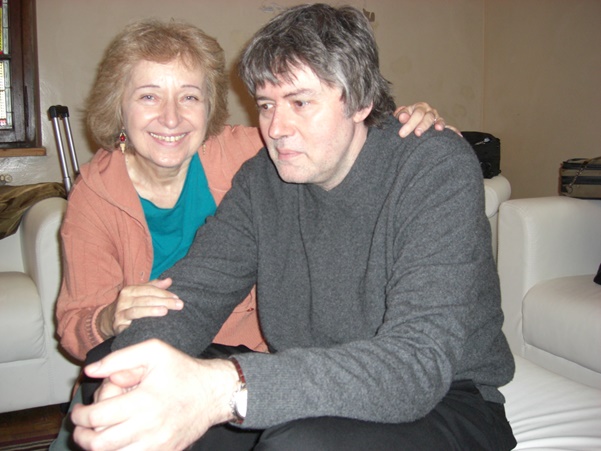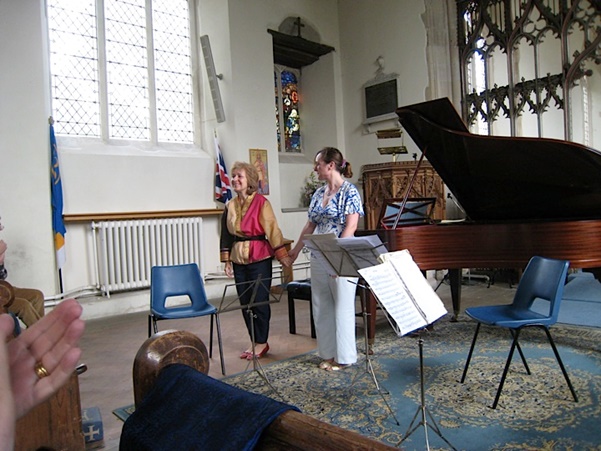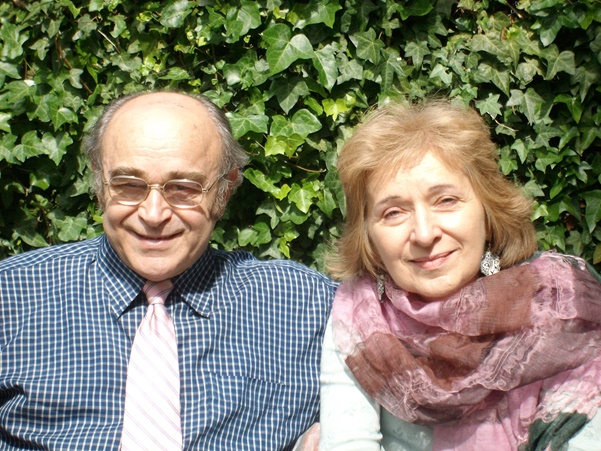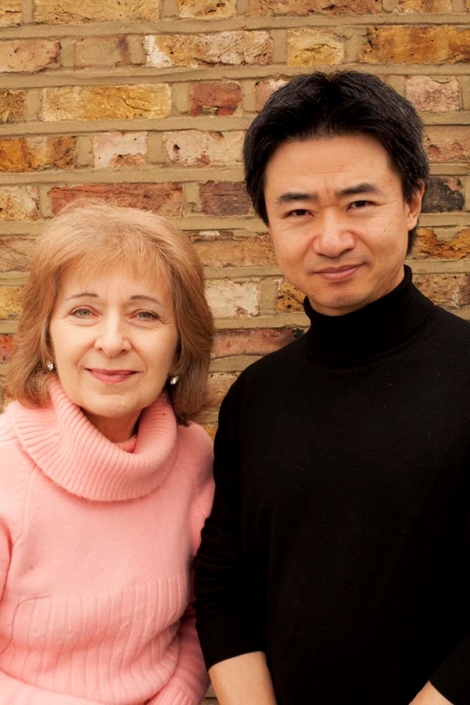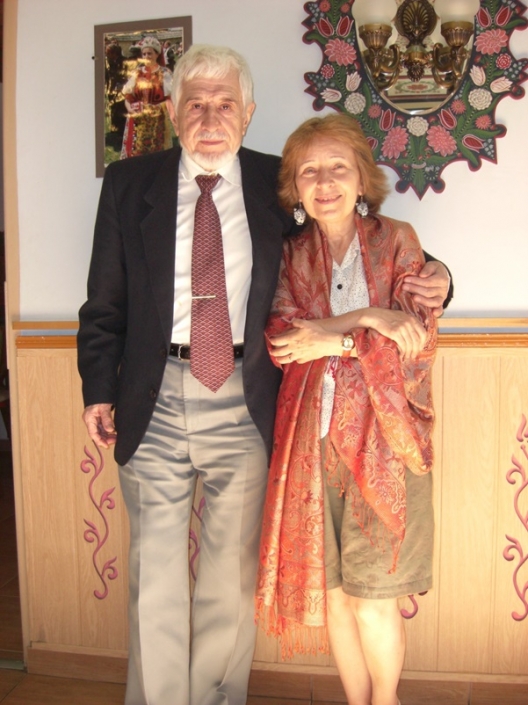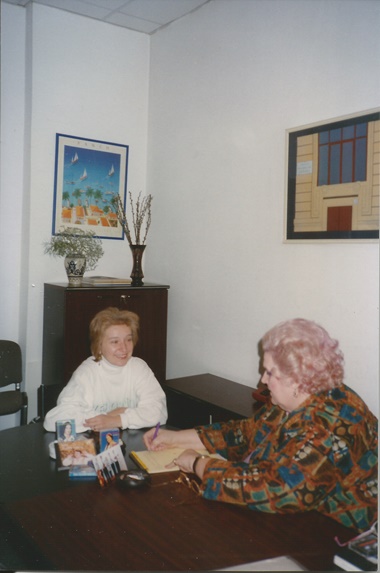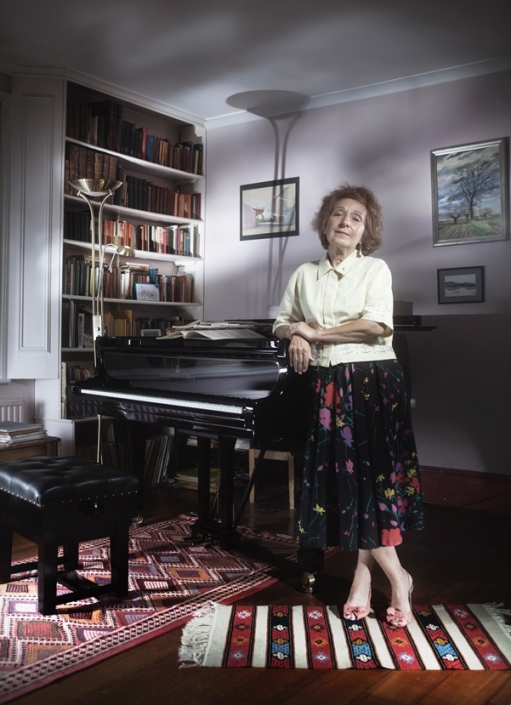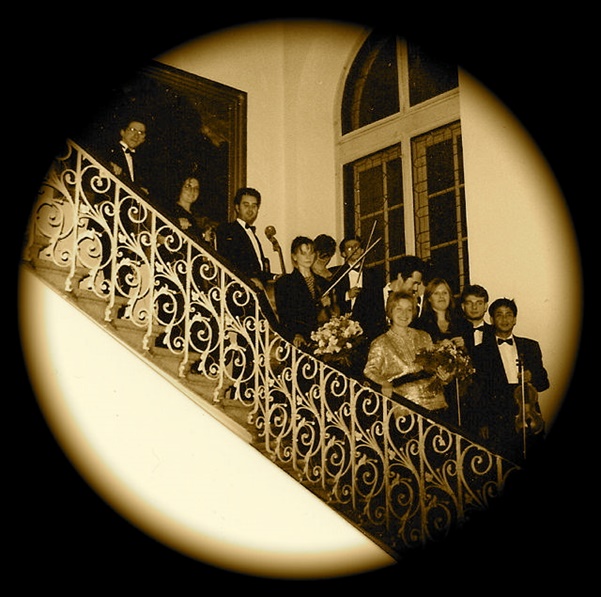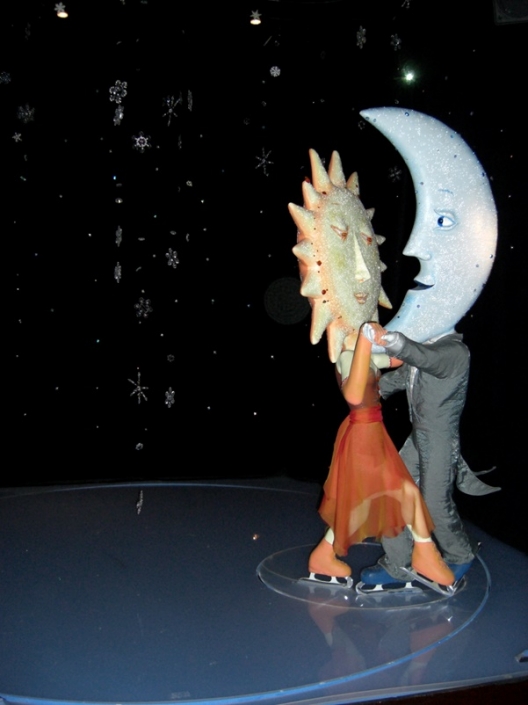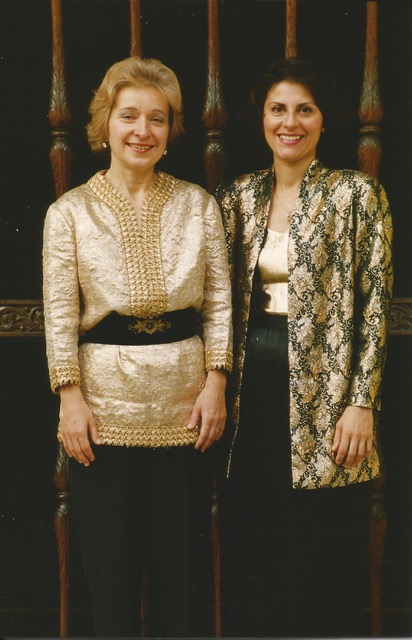MEMORABLE MOMENTS
A lesson in devotion and perfectionism: watching Sviatoslav Richter just after the applause had ended for his performance in Bucharest’s Athenaeum concert hall go back to the piano in the Green Room to try to rectify things that didn’t go to his liking in the recital. My piano teacher, Ludmila Popisteanu, was Richter’s official interpreter in Romania and she presented me to the master for what was a unique and humbling experience, an unforgettable lesson for a young school student.
Recognition after exile: Romania’s President slipped around my neck the Decoration Commander of the Order of Cultural Merit during a ceremony in London 30 years after I had been effectively exiled by the former regime in 1973.
Like walking on air: stepping for the first time onto the beautiful stage floor of a packed Royal Festival Hall. I was there to perform Mozart’s Piano Concerto K414 with the BBC Concert Orchestra. A dream come true.
In the steps of my hero: performing in Bournemouth’s Winter Gardens concert hall on the very stage where my hero, Constantin Silvestri, worked for eight years with the Bournemouth Symphony Orchestra as Principal Conductor. I played Dinu Lipatti’s Three Romanian Dances as a UK Première with the Silvestri State Philharmonic Orchestra from Targu Mures, Romania. The historic hall has since been demolished but the memory remains.
An invitation reciprocated: Yehudi Menuhin accepted my invitation that he be the first Patron of the Constantin Silvestri International Festival which I initiated in Romania but, later, I watched a ‘Fax’ come through, with his invitation to me to perform under his baton Lipatti’s Sinfonia Concertante in London, Paris and Geneva.
Stories of courage: in Namsos, Norway I played on one of the most beautiful Steinway pianos I have ever came across for the unveiling of the British War Memorial secured by my husband, John Gritten, to those who died trying to resist the Nazi occupation of Norway in May 1940. I was privileged to perform before and to meet World War II veterans. To hear their fascinating and courageous stories changed for ever my outlook on life.
Commemorating a fallen friend: in memory of my childhood friend Dorit Shaked I gave a piano recital in Yad Lebanim in Haifa, the memorial to fallen Israeli soldiers. Our friendship flourished in secret in Bucharest, in spite of Romania’s ban on relationships between Romanian nationals and foreigners. Dorit was the daughter of an Israeli Embassy official and lived in my street. At the age of 18, she had to return to Israel to do her military service only to be killed soon after by shrapnel from a Syrian shell on the Golan Heights.
True inspiration: sharing the stage and then discuss with Martha Argerich in London’s Kings Place concert hall where I performed Silvestri’s Romanian Folk Dances from Transylvania. Martha had been one of Silvestri’s soloists in the 60s.
The magic of a night at sea: on the deck of the ship that took us across the Mediterranean during my first concert tour with the London Schubert Players in Spain and North Africa, we slept under the stars, in balmy weather. The romantic experience produced an unexpected, non-musical success: two of the players got engaged and subsequently married!
Face-to-face encounters: for my Invitation to Composers project for the European Commission as an organiser and a performer I worked with 29 participant composers. The dialogues, the interest in one another’s musical ideas, horizons and skills, and the building of musical and personal friendships has had an impact that has lasted and enlightened.
Walking the plank: On a beautiful summer evening, my concert with the London Schubert Players in the Santander International Festival in Spain was changed at the last minute into an outdoor event. In the gardens of the auditorium, the piano was housed on a plank and the piano stool, chairs and music stands were placed directly on the grass. But heavy rain over the previous days had softened the ground. While playing the Mendelssohn Piano and Violin Concerto, the legs of my piano stool gradually sank lower and lower into the earth, until my hands could no longer reach the keyboard in a safe position to play this technically demanding music. We had to stop until pianist and stool could be placed on a plank too!
When boos turned to applause: The Pavilion Theatre in Rhyl was full to its capacity of 1,031, with school pupils, parents and teachers for an educational concert programme I was presenting with the London Schubert Players. The orchestra seated, I introduced myself to the audience as a Romanian musician. Instantly, an explosion of loud and enthusiastic ‘Boos’ came at me from all directions. Little did I know that the night before, those kids had watched England’s football team being defeated by Romania during the World Cup! Thankfully, the boos turned into laughter and the youngsters were captivated by the concert.
Crossing national boundaries: One of the concerts produced by my Romanian Musical Adventure Festival was an evening of Romanian Christmas Carols in St Martin-in-the-Fields, Trafalgar Square. The English a cappella choir learnt to sing them in Romanian and during the concert, conductor John Landor taught the audience to sing the chorus of one. The church was packed at that time and it was an extraordinary experience to hear my favourite childhood Christmas Carol sung by hundreds of people of all nationalities gathered in that iconic venue.
A Romanian onion for Japan: After one of my annual Silvestri Scholarship Competitions in Romania, I accompanied the distinguished Swiss violinist Ursula Bagdasarjanz – one of the competition’s jurors – on a personal discovery trip to a remote village, where her Armenian father had been born ‘in transit’. Her grandparents had fled Armenia and had to walk all the way to Switzerland. Warmly welcomed in a remote village in the Dobrogea province in South-Eastern Romania, where the fields of sun flower and maize stretch to the horizon under a hot sun, a son was born. With us was Hideka, a Japanese pianist I had invited to give a concert. The village was poor. We were invited in by one peasant family. They greeted us with strong fruit brandy. No Japanese person had been there before and Hideka became the centre of attention. She was taken on a tour of their most valuable possessions: the orchard, the vegetable garden, the hen and the rabbit hutches. Returning with a beautiful red onion she assured the man of the house that she would plant it in Japan as a symbol of friendship! A humble gift maybe, but gold for the donor and given wholeheartedly as such. Maybe there are as many Romanian onions now in Japan as Hideka and Ursula have notes in their playing. The photograph of that moment is still with me now.
Spellbound by eternal beauty: the giant statues of reclining Buddhas, lying asleep on the grass – like you and me – in the middle of nature in the ancient Sri Lankan city of Polonnaruwa have a serenity on their faces and in their sculpted body language that created an other-worldly poetry and a sense of eternity and beauty as I wandered among them. I have never shaken off that spell. Those faces recur often in my imagination.
